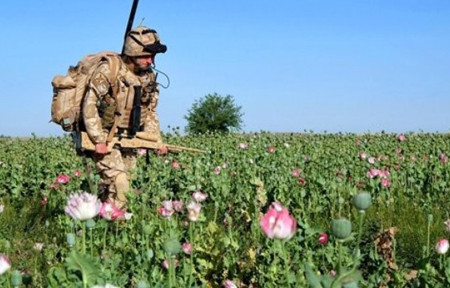AFP, February 2, 2010
Afghan drug trade fuels insurgency
"But the farmers are not guilty of buying guns, they just have to make a living"
By Lawrence Bartlett
From the watchtower at an Afghan outpost, the Dutch soldiers can follow the growth of the pretty poppies that may one day pay for the weapons that kill them or their comrades.

A British soldier in a poppy field in Maywand region of Kandahar. (Photo: AP)
Taliban insurgents waging an increasingly deadly campaign against foreign troops make at least 100 million dollars a year from taxing Afghanistan's opium trade -- the world's biggest, US and Afghan officials say.
According to the Pentagon "there is a well established connection between the drug trade and financing the insurgency."
But even as the colourful flowers build up the potent juices that will help fund their enemies, the Dutch will not intervene.
"If we know who is the nexus between the Taliban and poppy, this is a very important target for us and we will do something about it," the commander of Dutch forces in Uruzgan province, Brigadier General Marc van Uhm, told AFP.
"But when we look at the farmers who make a living from growing poppy we don't support the active eradication because when you eradicate their fields they don't have an income any more.
"If they can't feed their families then what we do is alienate them from us, they blame us -- you drive them into the hands of the Taliban."
The Netherlands is the lead nation for NATO's coalition troops in southern Uruzgan province, one of the poorest in Afghanistan -- and the fourth biggest producer of poppy.
Wiping out the crop has been part of efforts to stabilise Afghanistan since the hardline Islamist Taliban regime was ousted by a US-led invasion in 2001.
The US-backed Afghan government of President Hamid Karzai has in the past deployed teams that moved in and destroyed vast fields of poppies before they could be harvested.
But Afghanistan still produces more than 90 percent of the opium base used to manufacture heroin worldwide -- worth some 2.8 billion dollars in 2009, according to United Nations figures.
While the use of intoxicants such as alcohol and drugs is forbidden under Islam, the religious leaders of the Al-Qaeda-linked Taliban have found the cash from the opium trade irresistible, analysts say.
"It is a perfect coincidence of interests between the farmers and the insurgents," one US official told AFP on condition of anonymity.
The poppies, which provide rich pickings in one of the world's poorest countries, also play a large part in the corruption that plagues Afghan life at every level, from district to national government.
With so many people profiting from poppies on both sides of the war, efforts to wean farmers off a crop that provides them with an income several times higher than they could earn from wheat or other mainstream produce is not easy.
The chief civil representative on Task Force Uruzgan, Michel Rentenaar, says the Dutch aim to encourage farmers to turn to alternative crops, such as saffron and fruit and nut trees.
"Our effort is to supply an alternative livelihood. We have had success with introducing saffron in the province, the harvest has increased every year for the past three years.
"Saffron is incredibly expensive and its yield is about two to three times higher than poppy. But it is slow to convince farmers to change."
The 2008/2009 harvest was 50 kilogrammes (110 pounds), while this year's is expected to be almost double that, and of better quality.
While the figures are small, saffron has long been the world's most expensive spice by weight and a total of some 500 farmers are now growing it in Uruzgan, with a Dutch firm buying a large chunk of the harvest.
In comparison, however, 1.6 million people were involved in producing 6,900 tonnes of opium in 2009, the UN Office on Drugs and Crime says -- mostly in the southern provinces worst hit by the insurgency.
US President Barack Obama in November committed more than 38 million dollars to finance development projects or alternative crops in provinces that cut poppy production.
Washington last year also placed 50 alleged Afghan drug traffickers with suspected ties to the Taliban on a "kill list" of people targeted for elimination, according to a report by a US Senate committee.
"Major drug traffickers who help finance the insurgency are likely to find themselves in the crosshairs of the military," the Senate foreign relations committee report said.
But nothing more deadly than binoculars will be pointed at the poppy farmers who form part of the panoramic view from the Mirwais base watchtower, overlooking a fertile strip of river valley in the Chora district of Uruzgan.
The bearded men in turbans and flowing robes, living a hard life in a remote part of the world, will be allowed to continue nurturing the flowers that form the base of a huge, corrupt and lethal international trade.
This year the crop they produce will be more important than ever as the war escalates.
Last year was the deadliest for both foreign troops and civilians since the 2001 invasion. This year the West has begun a troop surge that will take the number of foreign soldiers in Afghanistan to some 150,000.
"It is strange," admits a Dutch soldier barely out of his teens, pondering the link between the poppy fields and the firepower of the insurgents as he stands guard in the watchtower.
"But the farmers are not guilty of buying guns, they just have to make a living," the young warrior-philosopher concludes.
Characters Count: 7011
